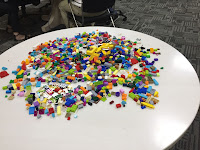In my whole professional career in IT I have been training others. I am not an educated trainer not do I want to be fulltime trainer but I have always find myself some possibilities to train others. I am more or less self-educated wanna-be trainer but that haven't stop me.
I have learned that interactive lessons are far better than lectures. I have done many of basic Agile trainings utilizing LEGO® bricks. And I know I am not the only one playing with legos in Agile trainings.
Some interesting examples from othersI know quite many have been participating trainings or workshops with lego games. I as a trainer am getting little bit tired for these lego games and I have heard trainees telling the same. After a while we all want something different.I haven't been conducting any basic Agile training for long times but if I'd definitely looked for something else. Nowadays, due to Covid-19, everything is happening remotely and for sure lego games wouldn't work really well. All around the world trainers have been looking for different ways to make trainings interactive in remote context.
I co-facilitated couple of SAFe trainings before I changed job this autumn. Due to restrictions in organization we used MS Teams and features made available for us. That was challenging but totally possible. It was up to us trainers and participants make these trainings interactive. I don't think it is fair to stay passive and complain afterwards that training should have been classroom training.
It is totally possible to stay passive also in classroom trainings. In groups there can be someone who makes others do all the work and in worst case (s)he might be the one who complains all the time so that no one enjoy the training. I have meet these people - as well as a trainer and a trainee. And I have to admit - I have been one myself also.
I have been wondering myself what does it tell about me or the others who are not willing to participate trainings which require interactions with other trainees. In Agile teams, collaboration and cooperation are important. What if you are not able be interactive and cooperate with your colleagues in one training - can you really be a team player.
Well, of course, there are people who simply hate games. For them these games are the worst nightmare. I have been wondering often what we should do with these guys. Maybe if I had degree in education I would have answer for that question.
I have never been in training where I wouldn't learned something. Even the facilitation training I hated truly - even from that training I took something with me. Sometimes I feel that people are not taking the responsibility to learn. It is not your trainers fault if you don't learn anything or pass the exam. I so do think taking ownership and responsibility of your own learning is the key.
Taking ownership, being responsible, collaborating - all that you need when being part of Agile team. No matter whether you follow Scrum or are part of Agile Release Train - you need those actions. If you don't like lego bricks or hate games consider how you can contribute and don't be the stick in the mud.


